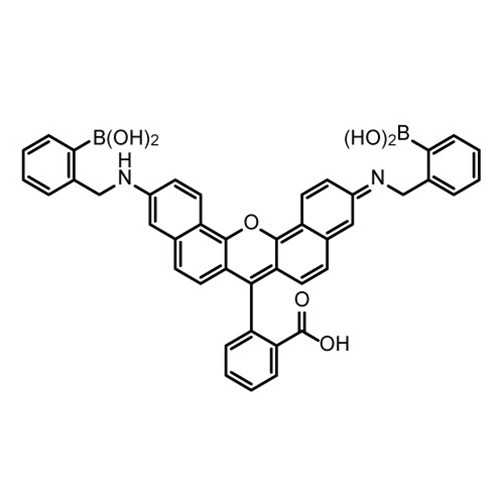RS-02 - Large Stokes-Shift NIR Dye (628 Ex/710 Em)-Acid
RS-02 is a near-infrared fluorescent dye with an excitation of 628nm and emission of 710nm.
Highlights:
- Essentially non fluorescent until reacting with diols, Emission at 710 upon reaction
The distance between the excitation and emission wavelengths is called the Stokes Shift and is a key aspect in the detection of the emitted fluorescence in biological applications. The detection of emitted fluorescence can be difficult to distinguish from the excitation light when using fluorophores with very small Stokes shifts, because the excitation and emission wavelengths greatly overlap. Conversely, fluorophores with large Stokes shifts are easy to distinguish because of the large separation between the excitation and emission wavelengths. The Stokes shift is especially critical in multiplex fluorescence applications, because the emission wavelength of one fluor may overlap, and therefore excite, another fluor in the same sample.
From the laboratory of Robert M. Strongin, PhD, Portland State University.
RS-02 is a near-infrared fluorescent dye with an excitation of 628nm and emission of 710nm.
Highlights:
- Essentially non fluorescent until reacting with diols, Emission at 710 upon reaction
The distance between the excitation and emission wavelengths is called the Stokes Shift and is a key aspect in the detection of the emitted fluorescence in biological applications. The detection of emitted fluorescence can be difficult to distinguish from the excitation light when using fluorophores with very small Stokes shifts, because the excitation and emission wavelengths greatly overlap. Conversely, fluorophores with large Stokes shifts are easy to distinguish because of the large separation between the excitation and emission wavelengths. The Stokes shift is especially critical in multiplex fluorescence applications, because the emission wavelength of one fluor may overlap, and therefore excite, another fluor in the same sample.
From the laboratory of Robert M. Strongin, PhD, Portland State University.
| Product Type: | Small Molecule |
| Name: | (Z)-2-(11-((2-boronobenzyl)amino)-3-((2-boronobenzyl)imino)-3H-dibenzo[c,h]xanthen-7-yl)benzoic acid |
| Chemical Formula: | C42H32B2N2O7 |
| CAS number: | 1416807-16-3 |
| Molecular Weight: | 698.33 |
| Extinction Coefficient: | 10759 |
| Tested Applications: | Detection of carbohydrates in the NIR. Selectivity can be tuned via solvent. |
| Ex/Em Maxima: | Essentially non fluorescent until reacting with diols. Emission at 710 upon reaction |
| Abs Max (nm): | 628 |
| Detection Method: | Fluorescence |
| Storage: | -20C; protect from light |
| Shipped: | Cold packs |
- Sibrian-Vazquez M, Escobedo JO, Lowry M, Strongin RM. Progress toward red and near-infrared (NIR) emitting saccharide sensors. Pure Appl Chem. 2012 Nov 1;84(11):2443-2456.
If you publish research with this product, please let us know so we can cite your paper.


